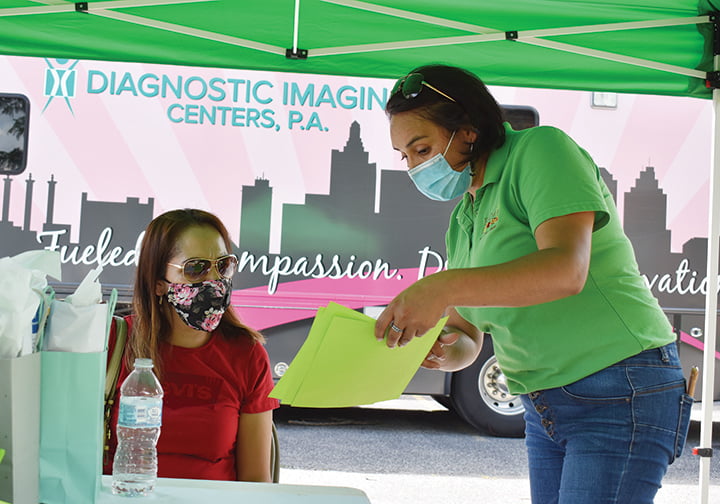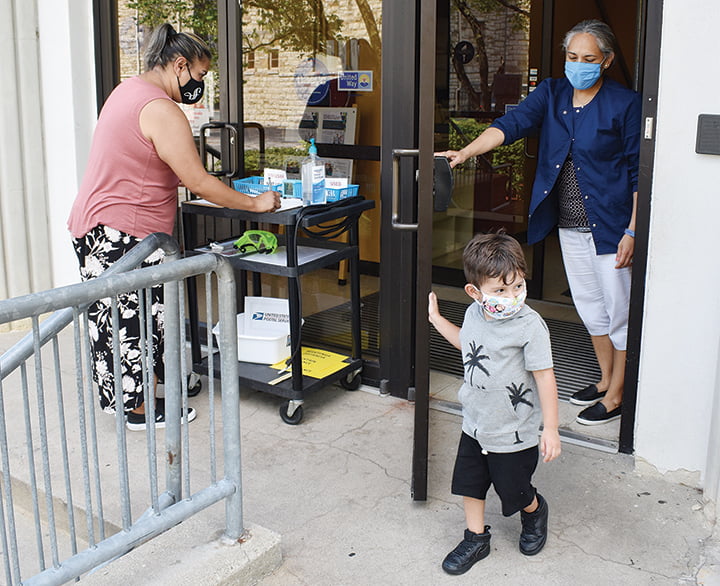
by Katie Peterson
Special to The Leaven
KANSAS CITY, Kan. — Since the COVID-19 pandemic hit the United States in early March, many businesses have been forced to close and people have been laid off or furloughed from jobs, causing financial stress for many.
But for the Latino community in Wyandotte and Johnson counties, El Centro Inc. has done everything it could to combat those effects.
“We here at El Centro never really stopped working,” said Irene Caudillo, president and CEO. “We just had to pivot in a way that was listening to what the community’s needs were.”
“That was really powerful for our organization to be able to say, ‘We can continue,’” she added. “It was just learning how to be fair with everyone and challenge our resources in an effort to make sure we’re not contributing to the unemployment but supporting those that were either laid off or furloughed.”
El Centro was founded by Father Ramon Gaitan, OAR, in 1976. Father Gaitan approached the Archdiocese of Kansas City in Kansas for help with the project and received a $10,000 grant to help establish it.
Now, El Centro is one of 40 ministries that benefit from Archbishop Joseph F. Naumann’s Call to Share program, as it attempts to support more than 18,000 Latino households through educational, social and economic opportunities.
El Centro staff and volunteers have done their best to continue those services throughout the COVID-19 pandemic.

Although the educational programs for kindergarten through sixth-grade students have not been able to continue, El Centro has been able to carry on with its dual language preschool program for 2-1/2- to 5-year-olds.
Parents bring their children to the program, Caudillo explained, because “Spanish is the primary language spoken in their home, and they just want their kids to be ready for kindergarten.
“Our motto is present it [such that] parents embrace the language as an asset,” she said.
To help avoid spreading the virus, only 40 children and 10 teachers are able to be in the building at any one time, meals are eaten in their classrooms and masks are worn by everyone except the children during nap time. Parents also drop off and pick up their children outside the building.
Along with childhood education, El Centro volunteers also provide health education ranging from smoking cessation to diabetes management to healthy eating on a budget and more, Caudillo said.
“We call them our health promoters,” Caudillo said. “They’re like community health workers that really just help give knowledge and really guide and give resources to our community.”
Because this part of outreach includes tours of grocery stores and live recipe demonstrations, the program has had to make adjustments.
“A lot of what they’re doing now is more virtual, like classes,” Caudillo said.
The second portion of the health initiative is dedicated to teaching people to navigate the health care system. Staff members of El Centro called “health navigators” work to help members of the community get health insurance or provide assistance for those who don’t qualify to get the health care they need.
“This program is really about helping keep folks away from the emergency room and really look at prevention,” Caudillo said.
The pandemic has slowed that program some since “a lot of appointments are based face-to-face,” she said. “But we still continue to do prescriptions because we can work with our safety net clinics and our clients on the telephone and online.”
The economic empowerment program of El Centro, meanwhile, works to help families who need financial assistance with things like rent and utilities until they get on their feet.
“The idea is that we’re going to support you in times of crisis, but we want to make sure you don’t have to come back here — or any system,” Caudillo explained. “We want you to be able to move forward.”
Because of the COVID-19 pandemic, the amount of assistance has increased.
“We’ve spent almost $70,000 to help assist in rent and utilities just for April and May,” she said.
The final component of El Centro’s outreach involves advocacy, which includes citizenship classes and encouraging participation in both the census and upcoming elections. Normally, this would mean going door to door in order to educate the community, but because of the virus, staff has had to improvise by using megaphones and driving through neighborhoods and utilizing social media.
“Those are two important civic engagement pieces that we really try to promote,” Caudillo said. “The census is important because of the dollars that come into our community to support programs. Their vote is their voice.”
Through everything, Caudillo said, nothing was going to stop El Centro from serving.
“We really did not close our doors. We’re not actually open to the public, but we did not stop working,” Caudillo said. “For most of us [who provide]social services, it is important for folks to understand that we actually continued even during this pandemic.
“Some might say we weren’t essential workers, but we were for a population and a community that we knew was very much hurting.”
How to help
El Centro has many volunteering opportunities. For more information, call (913) 677-0100.
For more information about how to donate funds, visit the website at: elcentroinc.com or follow El Centro on Facebook or on Twitter.






